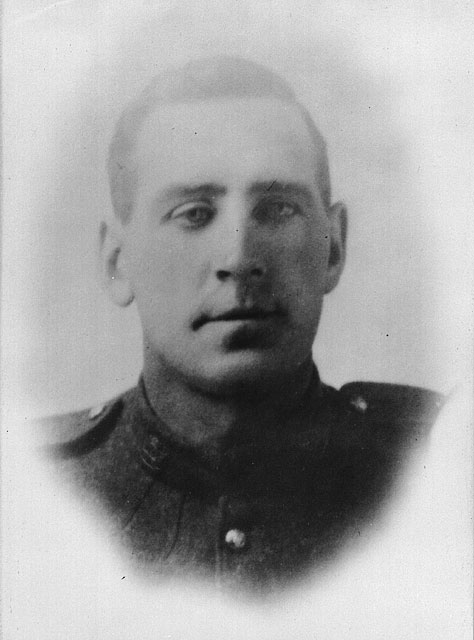Pte
James Peter Robertson
Information about birth
|
Date of birth: 26/10/1883 |
|
Place of birth: Pictou County, Nova Scotia, Canada |
General information
|
Profession: Engineer |
|
Religion: Presbyterian |
Army information
|
Country: Canada |
|
Force: Canadian Expeditionary Force |
|
Rank: Private |
|
Service number: 552665 |
|
Enlistment date: 14/06/1915 |
|
Enlistment place: Fort-Macleod, Alberta, Canada |
|
Units: — Canadian Infantry, 27th Bn. (City of Winnipeg) (Last known unit) |
Information about death
|
Date of death: 06/11/1917 |
|
Place of death: Passchendaele, Belgium |
|
Cause of death: Killed in action (K.I.A.) |
|
Age: 34 |
Cemetery
|
Tyne Cot Cemetery Plot: LVIII. Row: D. Grave: 6. |
Distinctions and medals 3
|
British War Medal Medal |
|
Victoria Cross Medal — 11/01/1918 |
|
Victory Medal Medal |
Points of interest 3
| #1 | Place of birth | ||
| #2 | Enlistment place | ||
| #3 | Place of death (approximate) |
My story
James Peter Robertson was the son of Alexander and Janet Robertson. He was born on 26 October 1883 in Pictou County, Nova Scotia, Canada. James worked as an engineer, nicknamed 'Singing Pete'. On 14 June 1915, he enlisted in the Canadian Army at the age of 32. He belonged to the 27th Battalion (6th Brigade, 2nd Division).
James died on 6 November 1917 at the Battle of Passchendaele. The 27th Battalion took part that day in an attack on the village of Passchendaele together with the 31st Battalion on their right and the 26th Battalion on their left. The attack started at 6am. As they advanced towards Passchendaele, they met resistance and came under fire from pillboxes north of the village. The 27th Battalion managed to reach Passchendaele first. By about 8.45 am, both the village and the eastern ridge were in Canadian hands. The rest of the day was spent consolidating the captured areas. During the attack, some nine machine guns were knocked out and some 76 prisoners taken. According to The London Gazette of 8 January 1918, James Peter Robertson also contributed to this. When his platoon was held up by uncut wire and a machine gun, James stormed forward to take out the machine gun. This allowed the platoon to continue the advance. After reaching the final objective, James positioned the captured machine gun so that he could fire on the retreating German troops. In doing so, he also prevented fire by German snipers while consolidating the captured areas.
The 27th Battalion paid a high price for the attack on 6 November 1917: no fewer than 262 casualties, including 13 officers. James Peter Robertson was one of them. According to the same article in The London Gazette, he was killed while trying to evacuate two wounded snipers from his own battalion. According to Captain Theodore Roberts, a grenade exploded during the evacuation of the second sniper, killing James instantly. The London Gazette of 11 January 1918 announced that James Peter Robertson would posthumously receive a Victoria Cross, the highest British military decoration. James was originally buried near Passchendaele, but was reburied in Tyne Cot Cemetery after the war.
James died on 6 November 1917 at the Battle of Passchendaele. The 27th Battalion took part that day in an attack on the village of Passchendaele together with the 31st Battalion on their right and the 26th Battalion on their left. The attack started at 6am. As they advanced towards Passchendaele, they met resistance and came under fire from pillboxes north of the village. The 27th Battalion managed to reach Passchendaele first. By about 8.45 am, both the village and the eastern ridge were in Canadian hands. The rest of the day was spent consolidating the captured areas. During the attack, some nine machine guns were knocked out and some 76 prisoners taken. According to The London Gazette of 8 January 1918, James Peter Robertson also contributed to this. When his platoon was held up by uncut wire and a machine gun, James stormed forward to take out the machine gun. This allowed the platoon to continue the advance. After reaching the final objective, James positioned the captured machine gun so that he could fire on the retreating German troops. In doing so, he also prevented fire by German snipers while consolidating the captured areas.
The 27th Battalion paid a high price for the attack on 6 November 1917: no fewer than 262 casualties, including 13 officers. James Peter Robertson was one of them. According to the same article in The London Gazette, he was killed while trying to evacuate two wounded snipers from his own battalion. According to Captain Theodore Roberts, a grenade exploded during the evacuation of the second sniper, killing James instantly. The London Gazette of 11 January 1918 announced that James Peter Robertson would posthumously receive a Victoria Cross, the highest British military decoration. James was originally buried near Passchendaele, but was reburied in Tyne Cot Cemetery after the war.
Sources 5
|
McCarthy, Chris. Passchendaele: The Day by Day Account (Londen: Arms & Armour Press, 1995), 137-138. Sources used |
|
Personnel Records of the First World War (Library and Archives Canada, Ottawa (LAC) RG 150, Accession 1992-93/166, Box 8360 - 16). https://www.bac-lac.gc.ca/eng/discover/military-heritage/first-world-war/personnel-records/Pages/search.aspx Sources used |
|
Snelling, Stephen. VCs of the First World War: Passchendaele 1917 (sl.: Wrens Park Publishing, 2000), 268-273. Sources used |
|
War diaries: 27th Canadian Infantry Battalion (Library and Archives Canada, Ottawa (LAC), RG9-III-D-3, Volume number: 4935, Microfilm reel number: T-10738--T-10739, File number: 423). https://library-archives.canada.ca/eng Sources used |
|
War Graves Registers: Circumstances of Death (Library and Archives Canada, Ottawa (LAC), RG 150, 1992-93/314; Volume Number: 233). https://library-archives.canada.ca/ Sources used |
More information 4
|
Commonwealth War Graves Commission Database https://www.cwgc.org/find-records/find-war-dead/casualty-details/464460 |
|
Namenlijst (In Flanders Fields Museum) https://namenlijst.org/publicsearch/#/person/_id=9195c3ef-a672-4b09-b944-adb85e4f79be |
|
Lives of the First World War (Imperial War Museum) https://livesofthefirstworldwar.iwm.org.uk/lifestory/6090685 |
|
The Canadian Virtual War Memorial https://www.veterans.gc.ca/eng/remembrance/memorials/canadian-virtual-war-memorial/detail/464460 |
